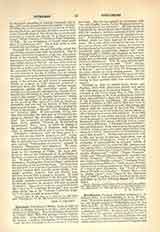

Fitzsimon (FITZ SIMON), HENRY, Jesuit, b. 1566 (or 1569), in Dublin, Ireland; d. November 29, 1643 (or 1645), probably at Kilkenny. He was educated a Protestant at Oxford (Hart Hall, and perhaps Christ Church), 1583-1587. Going thence to the University of Paris, he became a zealous protagonist of Protestantism, “with the firm intention to have died for it”, if need had been. But having engaged in controversy with “an owld English Jesuit, Father Thomas Darbishire, to my happiness I was overcome”. Having embraced Catholicism he visited Rome and Flanders, where, in 1592, he “elected to militate under the Jesuits’ standard, because they do most impugn the impiety of heretics”. In 1595 there was a call for Jesuit laborers for Ireland, which had been deprived of them for ten years. He at once offered himself for the post of danger, and he shares with Father Archer the honor of having refounded that mission on a basis that proved permanent amid innumerable dangers and trials. Keeping chiefly to Dublin and Drogheda he was wonderfully successful in reconciling Protestants, and he loudly and persistently challenged the chief Anglican divines to disputation. With the same fighting spirit he laughed at his capture in 1600. “Now”, said he, “my adversaries cannot say that they know not where to find me”; and he would shout his challenges from his prison window at every passing parson. But his opponents, James Ussher, Meredith Hanmer, and John Rider, in spite of their professions, carefully avoided coming to close quarters with their redoubtable adversary.
Banished in 1604, he visited Spain, Rome, and Flanders, 1611-1620, everywhere earnest and active with voice and pen in the cause of Ireland. After the outbreak of the Thirty Years War, in July, 1620, he served as chaplain to the Irish soldiers in the imperial army, and published a diary, full of life and interest, of his adventurous experiences. He probably returned to Flanders in 1621 and in 1630 went back to Ireland, where he continued to work with energy and success until the outbreak of the Civil War (1640). In the ensuing tumult and confusion, we are unable to follow his later movements with certainty. At one time we hear that he was under sentence of death, from which he escaped in the winter of 1641 to the Wicklow Mountains, and after many sufferings died in peace, probably at Kilkenny. “Not many, if any Irishmen”, says his biographer, while reflecting on the many universities, towns, courts and armies which Father Fitzsimon had visited, “have known, or been known to, so many men of mark”. Besides one controversial work in MS., not known to previous biographers, now at Oscott College, Birmingham, which is entitled “A revelation of contradictions in reformed articles of religion”, dated 1633, he wrote two MS. treatises, now lost, against Rider; and afterwards printed against him “A Catholic Confutation” (Rouen, 1608); “Britannomachia Ministrorum” (1614); “Pugna Pragensis” (1620) and “Buquoii Quadrimestreiter, Auctore Constantio Peregrino” (Briinn, 1621, several editions, also Italian and English versions); “Catalogus Priecipuorum Sanctorum Hiberniae” (1611, several editions), important as drawing attention to Irish hagiography at a time of great depression. His “Words of Comfort to Persecuted Catholics”, “Letters from a Cell in Dublin Castle”, and “Diary of the Bohemian War of 1620″, together with a sketch of his life, were publisher-Father Edmund Hogan, S.J. (Dublin, 1881).
J. H. POLLEN

